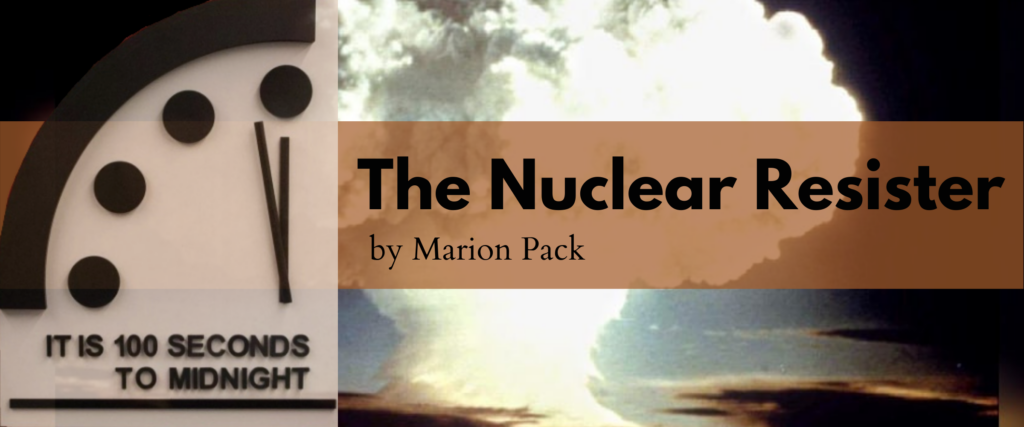
Nuclear Resister – UK PR Issue 4
Two Steps Forward, One Step Backwards – U.K. Announces Move to Increase its Nuclear Warheads.
On the heels of the exciting announcement of the ratification of the Treaty on the Abolition of Nuclear Weapons in January, in mid-March Great Britain announce its plan to increase its nuclear weapons stockpile. This announcement flies in the face of Britain earlier pledges on nuclear disarmament.
In January of 2017, now president Biden said, “As a nation, I believe we should keep pursuing peace and security for a world without nuclear weapons, because that is the only surety we have against the nightmare scenario from becoming a reality. If we want a world without nuclear weapons, the US must take initiative and lead the world.”
Now is the time to hold him to his pledge!
The next issue of Nuclear Resister will be about one leg of the US nuclear strategic triad, intercontinental ballistic weapons and why we would be more secure without them.
(click link for full article)
Arms Control Association
For Immediate Release: March 15, 2021
Media Contacts: Daryl G. Kimball, executive director, (202) 463-8270 ext 107; Kingston Reif, director for disarmament policy, (202) 463-8270 ext 104
The United Kingdom announced today that it will move to increase its total nuclear warhead stockpile ceiling by over 40 percent and reduce transparency about its nuclear arsenal. This is a needless and alarming reversal of the longstanding British policy to reduce the number and role of nuclear weapons.
These changes, which are outlined in Prime Minister Boris Johnson’s Integrated Review of Security, Defence, Development and Foreign Policy, are also inconsistent with the British government’s prior pledges on nuclear disarmament under the 1968 Nuclear Non-Proliferation Treaty (NPT). The United Kingdom now joins China and perhaps Russia as the permanent members of the UN Security Council that are planning to increase the size of their warhead stockpiles. Open source estimates put the current size of the British arsenal at 195 warheads.
The review attributes the need to increase the total stockpile ceiling from the goal of 180 warheads (which was reaffirmed in 2015) to 260 warheads to “the evolving security environment, including the developing range of technological and doctrinal threats,” but it does not explain how raising the number of warheads will enhance deterrence against these threats.
The United Kingdom’s decision to increase its warhead stockpile will contribute to the growing competition and distrust between nuclear-armed states. There is no compelling military or strategic rationale that justifies such an increase.
The review also states that the United Kingdom, which fields its warheads on sea-based ballistic missiles, will “no longer give public figures for our operational stockpile, deployed warhead or deployed missile numbers.” Like the United States, the United Kingdom’s past commitment to transparency about its nuclear forces has set it apart from other nuclear powers. Both governments have rightly criticized China for its excessive nuclear secrecy, for example. Such opacity is irresponsible and undemocratic.
The next NPT Review Conference slated for this summer was already poised to be a difficult and contentious one given the Trump administration’s efforts to expand the role and capability of the U.S. nuclear arsenal, Russia’s development of grotesque new nuclear delivery systems (such as a nuclear-armed torpedo), and China’s continued modernization and expansion of its nuclear forces. The United Kingdom’s decision to increase its arsenal and clamp down on transparency will further worsen the atmosphere.
In addition, the United Kingdom’s new direction will complicate the Biden administration’s efforts to pursue further bilateral arms control and reduction measures with Russia. Russia has been adamant that any future nuclear cuts beyond the limits contained in the 2010 New Strategic Arms Reduction Treaty (New START) should take into account the arsenals of the other nuclear-armed states, especially the United Kingdom and France. Moscow can be expected to make this argument even more forcefully after the United Kingdom’s announcement today.
President Biden and has pledged to “take steps to reduce the role of nuclear weapons in our national security strategy.”
With the United Kingdom headed in the opposite direction, the Biden administration should cast an even more critical eye on the Trump administration’s weak rationale for accelerating the development of a newly designed third submarine-launched ballistic missile warhead (known as the W93) – and London’s lobbying of the U.S. Congress for support of U.S. funding for this new weapon.
The Trump administration justified the W93 in part on the grounds that it is vital to continuing U.S. support of the United Kingdom’s nuclear arsenal. But the United States can continue to support its ally without rushing forward with this new and unnecessary new nuclear warhead program
